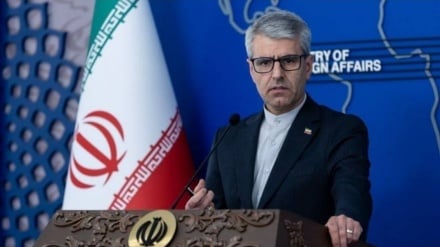Why Palestinian groups call Sharm el-Sheikh summit ineffective
-

A picture of Sharm el-Sheikh summit
Pars Today – Hamas, in a statement, disregarding the Sharm el-Sheikh summit, emphasized the need to uphold the legitimate rights of the Palestinian people.
The Palestinian Islamic Resistance Movement, Hamas, issued a statement congratulating the release of Palestinian prisoners from Israeli jails, calling it a historic national achievement. The group affirmed that resistance and adherence to Palestinian national rights are the only path to liberate occupied land, enable the return of refugees, and establish an independent Palestinian state.
Hamas also warned that Israeli officials, particularly prime minister Benjamin Netanyahu and cabinet members Itamar Ben-Gvir and Bezalel Smotrich, cannot prevent the Palestinian people from celebrating the achievements of the resistance.
The Sharm el-Sheikh summit, held on Monday, October 13, in Egypt, was reportedly aimed by U.S. officials at reaching a ceasefire agreement and ending the war in Gaza. However, Palestinian resistance movements, including Hamas and Islamic Jihad, did not participate in the meeting.
Palestinian resistance groups consider the Sharm el-Sheikh summit to lack legitimacy and view it as ineffective in securing the real rights of the Palestinian people. Since they were not directly involved in the negotiations, they continue to pursue their priorities independently of diplomatic processes.
Distrust of the U.S. role as mediator—especially given Washington’s political and military support for Israel—has led Palestinian resistance to regard the summit not as a genuine peace effort but as a political show.
Hossam Badran, a member of Hamas’ political bureau, warned that if the Israeli regime violates the ceasefire, the resistance will respond. He stressed that no agreement should be interpreted as a retreat from the core principles of the resistance.
Palestinian resistance maintains that agreements without enforcement guarantees and without the direct involvement of the parties in conflict cannot be sustainable.
Palestinian resistance considers the Sharm el-Sheikh summit part of a process that prioritizes the interests of major powers and the Israeli regime over the real rights of the Palestinian people. Resistance groups emphasize the right of return for refugees, an end to occupation, a halt to settlement expansion, and the release of prisoners, making these issues their priorities even if they are not addressed in formal negotiations.
The U.S. claims to act as a mediator while being the main military and political supporter of Israel, leading Palestinian resistance to view Washington’s role as biased and unfair. Palestinian groups, particularly Hamas and Islamic Jihad, distrust summits like Sharm el-Sheikh, seeing them as political processes that prioritize consolidating occupation and serving the interests of Israel and Western powers rather than advancing the rights of the Palestinian people.
Hamas and Islamic Jihad consider summits like Sharm el-Sheikh to be illegitimate, unproductive, and contrary to the aspirations of the Palestinian people. They prefer to advance their priorities through field resistance and unofficial negotiations with regional mediators.
As long as summits like Sharm el-Sheikh are held without the real presence and participation of key parties, without consideration for the fundamental rights of the Palestinian people, and dominated by Western powers, they cannot deliver Palestinian rights. Hamas and Islamic Jihad view resistance not merely as a reaction to aggression but as a long-term strategy to achieve the rights of the Palestinian people. They maintain that without field pressure and sustained struggle, no diplomatic mechanism alone can secure Palestinian demands.
From the perspective of Palestinian resistance, summits like Sharm el-Sheikh are held under the influence of the U.S. and its Western allies, often aiming to consolidate occupation and normalize relations with Israel. This distrust stems from historical experiences with previous agreements or temporary ceasefires, which were designed to benefit Israel while disregarding the legitimate rights of the Palestinian people.
Drawing on historical experience, analysis of summit structures, and adherence to the principles of resistance, Hamas and Islamic Jihad have concluded that Palestinian rights can only be restored through field resistance and sustained pressure. Summits like Sharm el-Sheikh, they argue, do not advance justice for Palestinians but instead serve as tools for crisis management and consolidation of occupation.


